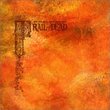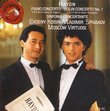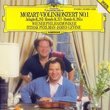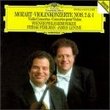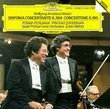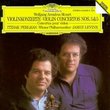| All Artists: Dmitry Shostakovich, Valery Gergiev, St. Petersburhg Kirov Chorus and Orchestra, St.Petersburg Kirov Orchestra, Rotterdam Philharmonic Orchestra Title: Shostakovich: Symphony No. 7 Members Wishing: 0 Total Copies: 0 Label: Philips Original Release Date: 1/1/1941 Re-Release Date: 5/13/2003 Genre: Classical Styles: Historical Periods, Modern, 20th, & 21st Century, Symphonies Number of Discs: 1 SwapaCD Credits: 1 UPC: 028947084525 |
Search - Dmitry Shostakovich, Valery Gergiev, St. Petersburhg Kirov Chorus and Orchestra :: Shostakovich: Symphony No. 7
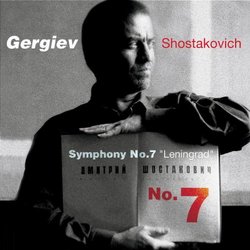 | Dmitry Shostakovich, Valery Gergiev, St. Petersburhg Kirov Chorus and Orchestra Shostakovich: Symphony No. 7 Genre: Classical
Shostakovich's "Leningrad" Symphony has been surrounded by controversy ever since it was written; it even ignited a battle between two great conductors, Toscanini and Stokowski, for the first American performance (Toscanin... more » |
Larger Image |
CD DetailsSynopsis
Amazon.com Shostakovich's "Leningrad" Symphony has been surrounded by controversy ever since it was written; it even ignited a battle between two great conductors, Toscanini and Stokowski, for the first American performance (Toscanini won). Composed in 1941 during the siege of Leningrad in homage to the Russian people's heroic resistance against the German invaders, it has been condemned by some as political propaganda, hailed by others as a symphonic masterpiece. Time and audiences everywhere have decided in favor of the latter view; today, the "Leningrad" is one of Shostakovich's best known, most popular symphonies. Though its programmatic content is clear, the emotional impact of the music itself invites listeners to imagine their own scenario. Gergiev has this music in his bloodstream and knows how to inspire an orchestra (two in this case); exploiting every instrumental resource, he elicits both massive and delicate playing, achieving powerful build-ups and tremendous climaxes. The result is a taut, concentrated performance that makes the symphony--Shostakovich's longest--seem shorter than usual; its no-holds-barred approach plumbs the depths and scales the heights of human experience, from bleak, grotesque irony to heart-breaking, anguished lamentation and ultimate triumph. The famous first movement march--a simple, deliberately trite little tune over a persistent snare drum figure--starts almost inaudibly; its eleven always different repetitions generate enormous suspense, and when the cumulative orchestration reaches its peak, you feel as if an entire army had marched over you. The recording's only flaw is its excessive dynamic contrast, so keep a finger on the volume control. --Edith Eisler Similarly Requested CDs
|
CD ReviewsThe sublime, bookended by the banal and the monumental. Bob Zeidler | Charlton, MA United States | 10/03/2003 (5 out of 5 stars) "You are probably wondering how it could be that a recording having the above brief description, seemingly denigrating at least parts of the work, nonetheless has the five-star rating I've chosen to give it. The explanation is simple, really. Valery Gergiev has taken this work very much to heart as "important" Shostakovich, putting his own imprimatur on it in the process, and has succeeded in bringing out details often overlooked, with the result that the work, despite its 'extramusical" connotations, emerges as "fresh" and unique as such a work might. Many of Shostakovich's works are programmatic to the extreme, involving - often - subtexts and even subtexts WITHIN subtexts. Probably, none do so more than his "war" symphonies, especially the 11th and the 7th under consideration here. Subtitled "Leningrad," this symphony, on its surface, depicts the German siege of that city in 1941, and the eventual victory of the Soviets over the Germans following that extended siege. Shostakovich personally experienced that siege, and, whether or not one chooses to accept various other subtexts (such as the Volkov "Testimony" one that describes the work in dramatically different terms), it is clear that this is in fact a "war" symphony such as only he might have written as a personal reaction to the German invasion. The "banal" of course describes the all-too-famous "center" of the opening Allegretto, with its incessant side drum tattoo accompanying a simple theme repeated twelve times, each time louder and with different forces than the previous. It is an obvious parody of Ravel's "Bolero," right down to an unexpected modulation to an unrelated key near its close. (Béla Bartók in turn parodied this theme in his "Concerto for Orchestra," presumably after having heard a radio broadcast of the work that drove him to distraction with its utter thematic banality.) But - often overlooked - is that the theme might also be described as a Shostakovich parody of a tune from Franz Lehar's "The Merry Widow," a connection I find fascinating, inasmuch as it provides a "Germanic" context that might put the lie to the Volkov subtext. In any event, Gergiev has provided us with the most gripping account of this "Bolero," shattering in its cumulative effect (starting from barely a whisper) and taken at a rather quick clip that I find appropriate. We find the sublime in the two inner movements, particularly with their overtly Mahlerian overtones. The third movement Adagio is remarkable in its content and structure, and it is here that I think Gergiev finds fresh substance and meaning that others all too often miss. Beginning with its Stravinskian "wind band" sonorities that lead into a beautiful cantilena on the strings that returns again and again, Shostakovich is at his most creative and "universal." There are Wagnerian sonorities in the lower brass, and a gorgeous flute solo that almost causes me to ask whether Ivan Sollertinsky, Shostakovich's closest friend and a Mahler specialist, shared some heretofore unknown knowledge regarding Mahler's unfinished 10th Symphony with him. Near the end of this remarkable movement, so full of imaginative and beautiful ideas, the trumpets introduce a malagueña-like theme, taken over by the full orchestra, and the work then proceeds without interruption into its "monumental" concluding Allegro. There is, to my way of thinking, more musical substance in the "monumental" than in the "banal," in that this final Allegro itself also has its share of sublimity, in the form of a brief respite from "the march to victory" in which a solo string line in the violins serves as yet another reminder that "Shostakovich knew his Mahler." But, soon enough, Gergiev leads us into a concluding coda that is truly shattering in its cumulative energy. Despite this being a very new release, it was recorded in late September, 2001 (in the shadow of 9/11, no less), at the Gergiev-led Rotterdam festival celebrating Shostakovich. Whether or not that date proximity is reflected in the enthusiasm and ardor so apparent in this performance is largely beside the point. I write these words with my ears still ringing from hearing a live performance of this work by Gergiev and his Kirov Orchestra a few evenings back, at the start of their current tour in the U.S. The performance was under "ideal" circumstances (perfect 10th-row center seats in my favorite local venue, Mechanics Hall in Worcester, MA, famed for its splendid acoustics). My aural memory of that event enables me to make a few relevant comments about this recording. It is nearly the match of what I heard (although what I did hear can only be described in superlatives full of hyperbole; a virtually "perfect" performance). The ensemble excellence of the Kirov alone exceeded that of the combined Kirov/Rotterdam forces. The orchestral forces were arrayed differently, clarifying some details in the process. (The work requires a huge orchestra, and the Kirov fully filled the Mechanics Hall stage.) More than likely, the principal oboist on the recording was a Rotterdammer; the Kirov principal oboist was at least slightly "tarter" (but consistent with the timbre one usually hears in Shostakovich works). And the dynamic contrast was, if anything, greater than what one hears on this recording. (The side drum tattoo and pizzicato strings beginning the inexorable "invasion" theme were just barely at the level of audibility, while the closing bars of the work near lifted the roof off the venue.) But please do not take these personal live-event observations as commentary about this recording being anything less than the best I have ever heard, and most likely the best available. The performance is indeed superb, Gergiev indeed has put his personal stamp on this work as being "major league" Shostakovich, and the dynamic range of this Philips recording is phenomenal enough. Bob Zeidler" Great subtlety, great power - Gergiev does it again! MartinP | Nijmegen, The Netherlands | 06/07/2003 (5 out of 5 stars) "Though not quite as dubious as the Twelfth, the Seventh has had some trouble over its reputation since its spectacularly successful premiere. Too long, too banal, too bombastic - just plain boring, even? Personally, I can't help but find it a stirring and moving work, well aware that I'll probably never find out to what extent this results from purely musical qualities rather than from knowing all the touching stories about its conception and premiere (which are among the most gripping demonstrations of the triumph of art over circumstances ever). Clearly Gergiev has no doubts whatsoever over this music: he understands that when you perform a work like this, the worst thing you can do is be apologetic about it. So he takes his time, even in those passages that just seem to drag on in search of some musical incident in other recordings. The great thing about Gergiev's reading is that he will bring out the incident that is actually already there, hidden in secondary voices. In several places for instance he will bring out surprisingly grinding dissonances, and his handling of the flutes' 'flatterzunge' at the end of the second movement makes the music sound totally modern. Also, he never neglects dynamic ebb and flow, and thus he succeeds in keeping the music alive without a single lapse in tension or interest for the nearly 80 minutes he takes. Also, he brings out the great beauties of the quieter moments (of which there are far more in this symphony than popular believe will have it); especially the second and third movements contain several passages of great tenderness and ethereal luminescence. Unlike I have come to expect from this conductor, this is therefore a very subtle and refined reading of a work not famous for subtlety. Gergiev keeps the lid on until the very last few pages, when finally the full contingent of brass is allowed to come into its own and have a ball. Which is not to say that preceding climaxes lack power, just that the succession of climaxes is carefully balanced, building up to the final one - which then is tremendously exhilarating. As a result, the symphony doesn't sound overblown and doesn't leave you worn out at the end, as it so easily does (rather, I was tempted to play this disc again right away). In some passages a typically Russian sound is adopted, with a deliberate roughness that is quite striking. The trio of the second movement is ferocious and extremely raucous, providing a stunning contrast to the subtleties of the menuetto. Also, the heart-rending progressions of wind chords at the start of the third movement are not presented as the usual, smooth chorale, but as some kind of urgent plea, strongly accented, and punctuated by rasping brass counterpoint - magnificent! The combined musicians of the Rotterdam and St. Petersburg orchestra's play their hearts out and cannot be faulted. They are set in an ample acoustic space - the massive auditorium of Rotterdam's Doelen hall can easily accommodate forces of this size, and in fact the recorded sound may strike you as somewhat distant. It is very spacious though, and extremely well detailed, and after turning up the volume a little bit I found it completely satisfying. I didn't notice any adverse effects of the extreme dynamic range that apparently bothered others; to me it seems the recording rather faithfully reproduces the extremes heard in the hall. By the way, you won't even hear the faintest whisper of the audience that was present during the recording, which was made live in concert. I'm still waiting to get acquainted with Bernstein's Chicago reading, but for now this recording goes to the top of my list, even surpassing the deeply committed and long cherished performance by Järvi and the Scottish National Orchestra. Strongly recommended!" A Powerful Leningrad D. A Wend | Buffalo Grove, IL USA | 09/21/2003 (5 out of 5 stars) "I have heard Dimitri Shostakovich's 7th symphony in concert and have had several recordings over the years. This one by Valery Gergiev is one of the more interesting because of the stretching of the tempos. This approach to music making is not new to Maestro Gergiev, who is forever seeking something more from the score, and in spite of the slower tempi, none of the drama of the 7th is lost. This recording also consists of two orchestras - the Kirov and the Rotterdam Philharmonic - yet even with the large forces (which do square with the score) the sound is well balanced without one group overwhelming others.For me, Gergiev offers a refreshing reading of Shostakovich's 7th symphony that brings out the despair, anger and optimism of the music. But this CD might disappoint those listeners who are accustomed to hearing this music played by Leonard Bernstein and the CSO or Nemi Jarvi and the Scottish National. If so, give this recording a chance. This is a CD that demands to be hear and is an outstanding example of Gergiev's showing us a new aspect to familiar music."
|

 Track Listings (4) - Disc #1
Track Listings (4) - Disc #1